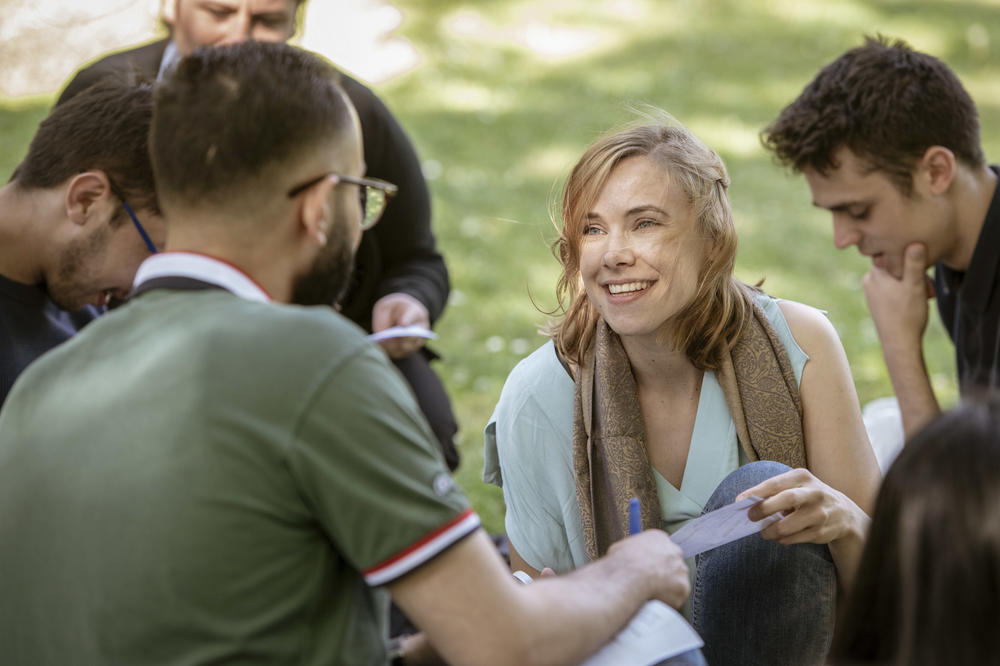A Network That Cushions People’s Landing
New program at Freie Universität supports at-risk and refugee researchers
Jun 05, 2019
Refugees can learn German through partnerships as part of the buddy program, where each participant is assigned a student partner.
Image Credit: Bernd Wannenmacher
An academic career is a challenge. The path to a professorship can be a long one, and it is fraught with uncertainty. Positions for junior scholars, scientists, and researchers are scarce, and the pressure to compete is intense. Many young researchers spend years bouncing from one fixed-term position to another. Figuring out how to get ahead is often difficult – and even more so for people who have been socialized in a different university system.
Now, Freie Universität Berlin has launched “Academics in Solidarity,” a project that helps at-risk and refugee researchers from other countries to find their feet in the German academic and research sector. “We have people signing up from Syria, for example, who had just finished their doctorate when the war broke out,” says Florian Kohstall, who initiated the project at the university with support from the Arab-German Young Academy of Sciences and Humanities (AGYA). “Or scholars from Turkey who lost their jobs for political reasons.”
The project, which is hosted by the Center for International Cooperation at Freie Universität, has received about 600,000 euros in funding for three years from the German Federal Ministry of Education and Research (BMBF). It involves a mentoring program: At-risk and refugee scholars, scientists, and researchers are matched up with established colleagues in Germany who offer advice and assistance.
“The academic systems in countries like Syria and Turkey are very different from the ones you find here,” Kohstall explains. In Syria, for example, scholars and scientists often spend their entire careers at the same university, starting with their doctoral studies. “Once you get a spot as a doctoral candidate, your contract often just keeps running from there,” he says. A German academic career, by contrast, often involves several stints in different places.
Junior scholars and scientists are also measured by different criteria. “You have to have the right publication strategy, for example,” Kohstall explains. Publishing in international journals – the more prestigious, the better – is hugely important in terms of the next steps after the doctorate. “And, of course, external fundraising has become an important career factor these days,” says Kohstall. Getting funding from institutions like the German Research Foundation (DFG) and private foundations requires grant writing, with complicated application processes to complete.
An initial workshop is planned to teach the skills needed for this. With support from Stifterverband für die Deutsche Wissenschaft, a two-day training session for mentees and their mentors will be held at Freie Universität in July. The event’s goal is to give junior scholars, students, and researchers a chance to learn and develop and apply for joint research projects. “Ideally, a researcher can create his or her own position for several years this way,” says Kohstall.
About 60 mentees and 50 mentors have already signed up for Academics in Solidarity. Vera Axyonova, who is coordinating the program, matches them up through a specific process. “We make sure not only that they both come from the same discipline, but also that they are at similar levels in their careers,” she says. “The goal is for them to work together as equals.” Most of the mentees are from Syria and Turkey, but there are also participants from Venezuela, Iraq, and Yemen. “They also run the whole gamut of disciplines,” Axyonova says, “from sociology to microbiology.”
The program is aimed primarily at people in the first few years after earning a doctorate, but applicants from very different professional situations are also considered. “In fact, we have also accepted doctoral candidates and people who were already working as professors in their home countries,” says Axyonova.
The goal now is to expand the program, step by step; plans call for further workshops and the development of a network. Kohstall and Axyonova recently traveled to Lebanon and Jordan to explore possibilities of working with universities there. “Our aim is to establish a transnational solidarity network,” Axyonova says. “We have a lot of plans for the future.”

